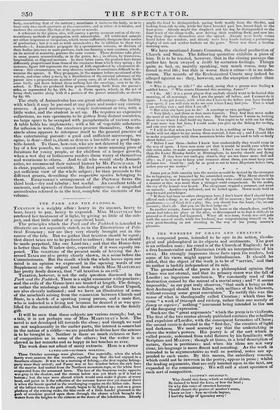THE WONDERS OF CHAOS AND CREATION
IS a compound poem, intended to be epic in its action, theolo- gical and philosophical in its objects and sentiments. 'The poet
is an orthodox mama; his creed is of the Church of England; he is a firm Immaterialist and Trinitarian (with an interpretation of his own). He strongly impresses these facts upon his readers, lest
some of his views might appear latitudinarian. It should be added, that the object of the work is to be of "service," and that its author is luckily independent of its sale. The groundwork of the poem is a philosophical opinion that Chaos was not eternal, and that its primary cause was the fall of
Lucifer; an ingenious conclusion. We constantly read of the destruction caused by the retreat of a mortal army ; and" it seems impossible," as our poet truly observes, "that such a being as the first Archangel should have fallen, with millions of his followers, without causing some great convulsion." To rectify this was the cause of what is theologically called Creation ; which thus be-
came "a work of triumph and victory, rather than one merely of fancy or caprice;" nothing "irreverent being intended in the use of the foregoing expression."
Such are the " great arguments" which the poem is to vindicate. The first of the two cantos already published contains the rebellion and expulsion of Lucifer, with the consequent formation of Chaos;
the second canto is devoted to the "first day," the creation of light and darkness. We need scarcely say that the undertaking is above the writer's powers. His poetry is of the sort which is called prosaic, redeemed from total flatness by his familiarity with Scripture and MILTON; though at times, in a brief description of nature, there is prettiness; and when his ideas are not very clear, his language is more fluent and sounding. As the work is intended to be argumentative as well as poetical, notes are ap- pended to each canto. By this means, the subsidiary reasons, which could not be inwoven in the poetry, appear in prose ; whilst the leading arguments, that are only touched upon in the text, are expanded in the commentary. We will cull a short specimen of each sort of composition.
LUCIFER'S SOLILOQUY.
Why should this form, which so refulgent shines, Be doomed to bend the knee, or bow the head ; Or why this voice of sweetest harmony Should ehaunt the praises of another's name, 1 know no law : base servitude begone, I hurl thy badge of ignominy away !




















 Previous page
Previous page